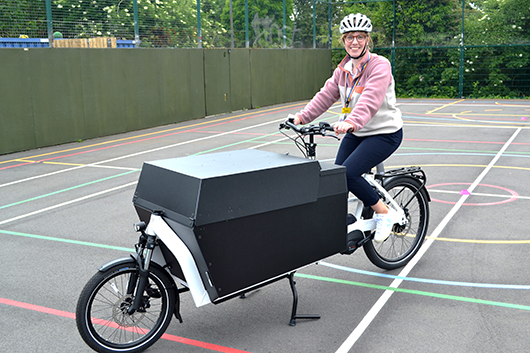Media Release
Date: 14 February 2024
RUH on target to deliver Sustainable Travel Plan
- 92% of sustainable travel actions have been completed or are in progress
- The travel plan supports the NHS national target to reduce 18% of the NHS carbon footprint currently attributed to travel

Since the launch of the Non-Patient Travel Plan in 2020, The Royal United Hospitals Bath (RUH) NHS Foundation Trust is on course to successfully deliver its ambitious 5 year sustainable travel strategy, meeting 92% of its actions.
The plan informs and supports staff and visitors to travel to the Trust in a way which is environmentally and socially sustainable as well as cost-effective. The RUH is scaling up a number of initiatives alongside our community partners to reduce air pollution in the area, including:
- More than doubling the cycle storage space onsite
- Introducing an e-bikes loan scheme for staff to trial
- Children's Therapies using an e-cargo bike to visit our patients in the community
- Launching the "Join My Journey" staff car sharing scheme
- Offering e-scooter discounts and a salary sacrifice scheme for electric and ULEV cars
- Supporting BANES "Kick the habit" campaign by encouraging everyone to turn their vehicle engines off when stationary
- Increasing air quality monitoring
- Increasing the value of bicycles available through the staff salary sacrifice cycle purchase scheme
- Subsidising staff discount for travel on First Bus services
- Encouraging use of public transport, including Park & Ride facilities
Ruth McNab, RUH Sustainability Manager said: "We have been conducting staff surveys, running site audits and working closely with our community partners to reduce the negative environmental impacts of travel as well as enabling equal access, regardless of ability. I wanted to thank staff, patients and visitors for their energy and enthusiasm in ensuring that we make steadfast progress towards achieving our remaining sustainable travel targets by 2025."
The Trust is also successfully progressing a number of other sustainability initiatives:
- Cutting carbon - Decommissioning anaesthesia nitrous oxide manifolds (fixed gas pipelines) and replacing with portable cylinders which has removed substantial risk of leaks of this potent greenhouse gas estimated to be nearly 300 times worse than carbon dioxide for the environment.
- Investing in sustainable built environments - The new Dyson Cancer Centre that has a targeted BREEAM 'Excellent' rating. The building is assessed at various stages during construction for its environmental sustainability and wellbeing benefits for patients, staff and the wider community.
- Finding ways to reduce waste – such as replacing sterile packaging with reusable metal containers saving environmental costs by 84% and reducing single use plastic disposal by 5.5 tonnes annually
- Green spaces – Works have started on a wellbeing garden for staff and patients launching this Spring
The Trust is also hosting an RUH Sustainability Day in the lead up to Earth Day in April 2024, which will focus on staff sharing ideas on reducing waste. The event will also host speakers from Greener NHS.
Cara Charles-Barks, RUH Chief Executive said: "We have a wide range of initiatives underway to reach our sustainability targets. These are important to us because we know that many of the actions needed to respond to the climate emergency also have positive health impacts. For example, cutting emissions and restoring biodiversity improves air quality and can reduce the incidence of asthma, heart attacks and stroke. Achieving these aims will require an unprecedented shift in behaviours and practices, and everyone has a role to play."
ENDS

